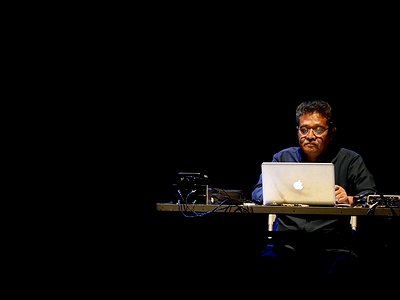Name: Otto Sidharta
Nationality: Indonesian
Occupation: Composer, sound artist
Current release: Otto Sidharta's Kajang LP is out January 13th via Sub Rosa. It follows his 2017 release Indonesian Electronic Music 1979-92 via the same imprint.
If you enjoyed this interview with Otto Sidharta and would like to find out more about his music, visit him on Instagram.
Where does the impulse to create something come from for you? What role do often-quoted sources of inspiration like dreams, other forms of art, personal relationships, politics etc play?
A creative idea, for me, mostly comes from my pure imagination of a stream of sounds.
It isn't trigered by any narative, textual story or visual aspect.
Is there a preparation phase for your process? Do you require your tools to be laid out in a particular way, for example, do you need to do 'research' or create 'early versions'?
No. The only thing I need to do is create and select the suitable sound for the idea I have in mind. Discovering how to achieve this can take quite a long time. But once all sounds are set, the composing process moves as fluently as the flow of a river.
Neither are any rituals required. I consider the activity of composing itself the ritual.
Often, while writing, new ideas and alternative roads will open themselves up, pulling and pushing the creator in a different direction. Does this happen to you, too, and how do you deal with it? What do you do with these ideas?
Yes, what you're desciring here has indeed sometimes happened.
I would say that as long this alternative idea is not too far removed from the original one, I will follow it. What matters is that the main idea remains the stream of sounds I initially envisioned.
There are many descriptions of the creative state. How would you describe it for you personally? Is there an element of spirituality to what you do?
Composing is like praying for me. So I feel very close to the divine spirit when I compose and when I listen to it again
What was your approach like for your current LP on Sub Rosa, Kajang? The way I understand it, for these pieces you visited the Kajang, a tribal people living in the south of Sulawesi in Eastern Indonesia.
The Kajang cut off their communication with the outside world. They live in a very traditional way and try to avoid any new development for their culture which might impact their way of life.
There were no other musicians involved for the process on Kajang. What you're hearing on the finished record is only myself using the sound materials I recorded and my own 'impression' from the people I visited and their culture.
When you say impressions – does that mean that the resulting pieces do not use sampling or concrete themes from their music?
Correct, I didn't borrow their musical elements.
Even when I did use some sounds taken from the music they played, these elements would be very short. They don't reveal any of their specific rythmic patterns or motives.
So what do you do, specifically, on location?
When I visit a place like I did for this record, I usually just walk arround, listen to the sounds surrounding me and record them. I'll talk to whoever I am interested in having a conversation with, watch anything that piques my interest - peoples and nature.
For a project like this one, I'll usually just try to get as many impression as possible and try to understand their culture. In a way, at this early stage, I didn't really think about the idea or make a plan on how to create something from whatever impressions I'd gathered.
So the music happens much later.
Yes, it happens usually after I get back home, and after quite some time has elapsed – which can be as long as a year. In a sense, it happens when I recall my memories about the trip.
It is at this point that I'll get an idea and I'll feel the need to express my feeling and thought about it. Which doesn't mean that things will always work out this way, though.
After Kajang was done, how did the Kajang respond to your work?
Talking with the traditional peoples about what I created based on their music or soundscape, they were mostly amazed and appreciative. They found their freedom and self confidence in relation to their music.
Especially in the digital age, the writing and production process tends towards the infinite. What marks the end of the process? How do you finish a work?
Just like I would do when praying, I follow my own feeling to decide for how long to continue the process or when to end it.
Once a piece is finished, how important is it for you to let it lie and evaluate it later on? How much improvement and refinement do you personally allow until you're satisfied with a piece? What does this process look like in practise?
Usually there are not so much refinement once it's done. The only thing i'll occasionally apply is some balance correction.
After finishing a piece or album and releasing something into the world, there can be a sense of emptiness. Can you relate to this - and how do you return to the state of creativity after experiencing it?
In fact, after I've released a piece, it actually makes me want to compose even more. Completing a project usually boosts my creativity.




